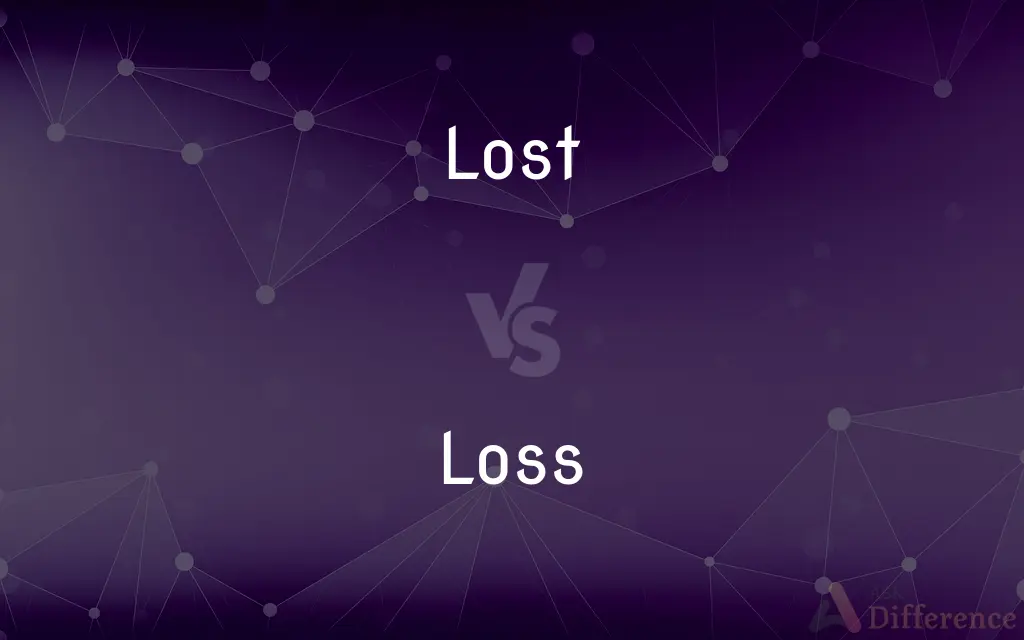Lost vs. Loss — What's the Difference?
By Tayyaba Rehman — Updated on November 1, 2023
Lost is an adjective describing something that can't be found or is not won; loss is a noun referring to the act or instance of losing.

Difference Between Lost and Loss
Table of Contents
ADVERTISEMENT
Key Differences
Lost, as an adjective, describes something that has been misplaced or is no longer in possession. Loss refers to the act or state of losing something or someone.
Lost is often used to indicate the inability to find one's way; a person may be lost if they do not know their location. Loss describes what one experiences when they no longer have something they value, such as a personal bereavement or a financial setback.
Lost can also pertain to not winning a game or a contest; for instance, a lost match means the game was not won. Loss, in a similar context, would be the result of the game, the fact of not winning.
When someone is described as lost, it may also reflect a state of confusion or aimlessness. Loss, on the other hand, encapsulates the feeling of absence that follows an event or action, such as the loss felt after the end of a relationship.
Lost functions as part of a verb phrase as well, such as in 'lost track of time', indicating the action of losing. Loss is often accompanied by of to specify what has been lost, like in 'loss of wealth'.
ADVERTISEMENT
Comparison Chart
Part of Speech
Adjective (sometimes past participle verb)
Noun
Usage
Describes state/condition of being lost
Refers to the act or fact of losing
Example
"He felt lost in the new city."
"The loss of her ring saddened her."
Relation to Time
Present or past state
Can refer to past, present, or future
Emotional Context
Can imply confusion or aimlessness
Implies the feeling of absence or lack
Compare with Definitions
Lost
No longer possessed
He lost his keys.
Loss
Act of losing possession
The loss of his estate was devastating.
Lost
Lacking understanding or direction
She felt lost after the divorce.
Loss
Disadvantage or deprivation
They suffered a severe loss after the storm.
Lost
Missing or overlooked
This detail cannot be lost in the discussion.
Loss
The act or an instance of losing
Nine losses during the football season.
Lost
Past tense and past participle of lose.
Loss
One that is lost
Wrote their flooded house off as a loss.
Lost
Unable to find one's way
A lost child.
Loss
The condition of being deprived or bereaved of something or someone
Her loss was made easier by the support of her friends.
Lost
No longer in the possession, care, or control of someone or something
A lost pen.
Loss
The amount of something lost
Selling at a 50 percent loss.
Lost
No longer in existence; vanished or spent
Lost youth.
Loss
The harm or suffering caused by losing or being lost
The doctor's retirement is a great loss to the community.
Lost
No longer known or practiced
A lost art.
Loss
Losses People lost in wartime; casualties.
Lost
Beyond reach, communication, or influence
The expedition was lost to the world for two months.
Loss
Destruction
The war caused incalculable loss.
Lost
Not used to one's benefit or advantage
A lost opportunity.
Loss
(Electricity) The power decrease caused by resistance in a circuit, circuit element, or device.
Lost
Having not been or unlikely to be won; unsuccessful
A lost battle.
A lost cause.
Loss
The amount of a claim on an insurer by an insured.
Lost
Beyond recovery or redemption; fallen or destroyed
A lost soul.
Loss
(countable) The result of no longer possessing an object, a function, or a characteristic due to external causes or misplacement.
Loss of limb; weight loss; loss of cognitive functions; loss of appetite.
Lost
Completely involved or absorbed; rapt
Lost in thought.
Loss
(uncountable) The destruction or ruin of an object.
Lost
Bewildered or confused
I'm lost—can you start over?.
Loss
(countable) Something that has been destroyed or ruined.
It was a terrible crash; both cars were total losses.
Lost
Simple past tense and past participle of lose
Loss
(countable) Defeat; an instance of being defeated.
The match ended in their first loss of the season.
Lost
Having wandered from, or unable to find, the way.
The children were soon lost in the forest.
Loss
(countable) The death of a person or animal.
We mourn his loss.
The battle was won, but losses were great.
Lost
In an unknown location; unable to be found.
Deep beneath the ocean, the Titanic was lost to the world.
Loss
(uncountable) The condition of grief caused by losing someone or something, especially someone who has died.
Her daughter's sense of loss eventually led to depression.
Lost
Not perceptible to the senses; no longer visible.
An island lost in a fog; a person lost in a crowd
Loss
The sum an entity loses on balance.
The sum of expenditures and taxes minus total income is a loss, when this difference is positive.
Lost
Parted with; no longer held or possessed.
A lost limb; lost honour
Loss
(engineering) Electricity of kinetic power expended without doing useful work.
The inefficiency of many old-fashioned power plants exceeds 60% loss before the subsequent losses during transport over the grid.
Lost
Not employed or enjoyed; thrown away; employed ineffectually; wasted; squandered.
A lost day; a lost opportunity or benefit; no time should be lost
Loss
(colloquial) lost
Lost
Ruined or destroyed, either physically or morally; past help or hope.
A ship lost at sea; a woman lost to virtue; a lost soul
Loss
The act of losing; failure; destruction; privation; as, the loss of property; loss of money by gaming; loss of health or reputation.
Assured loss before the match be played.
Lost
Hardened beyond sensibility or recovery; alienated; insensible.
Lost to shame; lost to all sense of honour
Loss
The state of losing or having lost; the privation, defect, misfortune, harm, etc., which ensues from losing.
Though thou repent, yet I have still the loss.
Lost
Occupied with, or under the influence of, something, so as not to notice external things.
To be lost in thought
Loss
That which is lost or from which one has parted; waste; - opposed to gain or increase; as, the loss of liquor by leakage was considerable.
Lost
Parted with unwillingly or unintentionally; not to be found; missing; as, a lost book or sheep.
Loss
The state of being lost or destroyed; especially, the wreck or foundering of a ship or other vessel.
Lost
Parted with; no longer held or possessed; as, a lost limb; lost honor.
Loss
Failure to gain or win; as, loss of a race or battle.
Lost
Not employed or enjoyed; thrown away; employed ineffectually; wasted; squandered; as, a lost day; a lost opportunity or benefit.
Loss
Failure to use advantageously; as, loss of time.
Lost
Having wandered from, or unable to find, the way; bewildered; perplexed; as, a child lost in the woods; a stranger lost in London.
Loss
Killed, wounded, and captured persons, or captured property.
Lost
Ruined or destroyed, either physically or morally; past help or hope; as, a ship lost at sea; a woman lost to virtue; a lost soul.
Loss
Destruction or diminution of value, if brought about in a manner provided for in the insurance contract (as destruction by fire or wreck, damage by water or smoke), or the death or injury of an insured person; also, the sum paid or payable therefor; as, the losses of the company this year amount to a million of dollars.
Lost
Hardened beyond sensibility or recovery; alienated; insensible; as, lost to shame; lost to all sense of honor.
Loss
The act of losing;
Everyone expected him to win so his loss was a shock
Lost
Not perceptible to the senses; no longer visible; as, an island lost in a fog; a person lost in a crowd.
Loss
Something that is lost;
The car was a total loss
Loss of livestock left the rancher bankrupt
Lost
Occupied with, or under the influence of, something, so as to be insensible of external things; as, to be lost in thought.
Loss
The amount by which the cost of a business exceeds its revenue;
The company operated at a loss last year
The company operated in the red last year
Lost
People who are destined to die soon;
The agony of the doomed was in his voice
Loss
Gradual decline in amount or activity;
Weight loss
A serious loss of business
Lost
No longer in your possession or control; unable to be found or recovered;
A lost child
Lost friends
His lost book
Lost opportunities
Loss
The disadvantage that results from losing something;
His loss of credibility led to his resignation
Losing him is no great deprivation
Lost
Having lost your bearings; confused as to time or place or personal identity;
I frequently find myself disoriented when I come up out of the subway
The anesthetic left her completely disoriented
Loss
Military personnel lost by death or capture
Lost
Spiritually or physically doomed or destroyed;
Lost souls
A lost generation
A lost ship
The lost platoon
Loss
The experience of losing a loved one;
He sympathized on the loss of their grandfather
Lost
Not gained or won;
A lost battle
A lost prize
Loss
Euphemistic expressions for death;
Thousands mourned his passing
Lost
Incapable of being recovered or regained;
His lost honor
Loss
The state of being bereaved
Her loss was felt by the entire community.
Lost
Not caught with the senses or the mind;
Words lost in the din
Loss
Reduction in quantity or value
The company reported a financial loss this quarter.
Lost
Deeply absorbed in thought;
As distant and bemused as a professor listening to the prattling of his freshman class
Lost in thought
A preoccupied frown
Loss
Elimination from a competition
Their loss in the semifinals was unexpected.
Lost
No longer known; irretrievable;
A forgotten art
A lost art
Lost civilizations
Lost
Perplexed by many conflicting situations or statements; filled with bewilderment;
Obviously bemused by his questions
Bewildered and confused
A cloudy and confounded philosopher
Just a mixed-up kid
She felt lost on the first day of school
Lost
Unable to function; without help
Lost
Not won, such as a game or battle
The team lost the championship.
Common Curiosities
Is 'loss' used to describe emotions?
Yes, it can describe feelings related to bereavement or lack.
Can objects be described as 'lost'?
Yes, when they cannot be found.
How does 'loss' relate to business?
It can describe financial deficits.
Can 'lost' be used as a verb?
Yes, as the past tense and past participle of 'lose'.
Can 'lost' be used temporally?
Yes, as in "lost time".
What does 'loss' signify in sports?
It refers to the outcome of not winning a game or match.
Is 'loss' a collective term?
It can refer to collective deprivation, as in "losses in a disaster".
Is 'loss' used in accounting?
Yes, for indicating negative finances.
Do 'lost' and 'loss' have similar emotional connotations?
Both can relate to feelings of absence or grief, but 'loss' is a noun describing the state, while 'lost' is an adjective.
What part of speech is 'lost'?
Lost is primarily an adjective.
Can 'lost' mean confused?
Yes, it can describe a lack of direction or clarity.
Can animals be 'lost'?
Yes, when they stray or are missing.
Can 'lost' describe a permanent state?
Not necessarily; something lost can sometimes be found.
Does 'loss' always imply sadness?
Often, but not always; context matters.
Is 'loss' always physical?
No, it can also be abstract, like the loss of reputation.
Share Your Discovery

Previous Comparison
Inspirational vs. Inspiring
Next Comparison
Choose vs. ChoseAuthor Spotlight
Written by
Tayyaba RehmanTayyaba Rehman is a distinguished writer, currently serving as a primary contributor to askdifference.com. As a researcher in semantics and etymology, Tayyaba's passion for the complexity of languages and their distinctions has found a perfect home on the platform. Tayyaba delves into the intricacies of language, distinguishing between commonly confused words and phrases, thereby providing clarity for readers worldwide.














































